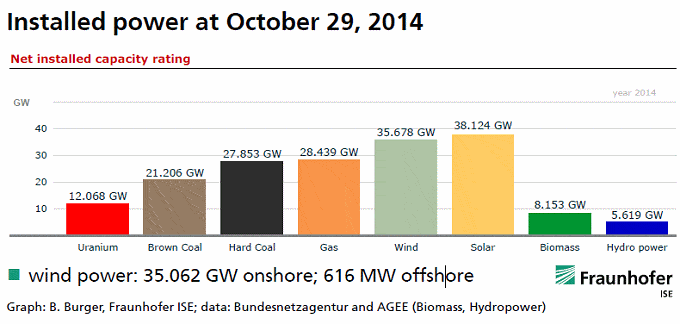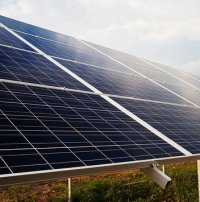2014 is the first year renewable energy has been the major source in Germany’s electricity generation mix.
According to preliminary surveys by the German Association of Energy and Water (BDEW), renewable energy based electricity generation reached 25.8 percent this year; up from 24.1 percent last year. Renewables provided 27.3 percent of gross domestic electricity consumption in 2014.
Electricity from renewables increased from 152.4 to 157.4 billion kilowatt-hours (expected). Wind turbines contributed 52.4 billion kWh and solar panels generated 35.2 billion kWh – the latter almost 14 percent more power than last year.
Biomass electricity production was up five percent from 46.6 billion kWh to 48.9 billion kWh and electricity generation from hydroelectric power reached 20.8 billion kWh.
Coal-fired power in Germany during 2014 was 10% less than in 2013. Coal’s share in the nation’s energy mix dropped to 18%. Gas-fired power plants dropped to 9.7% and nuclear energy’s share increased by half a percent to 15.9%.
2014 saw all sorts of new renewable energy related records set in Germany. Most recently, wind power achieved a new record of 29.7 GW peak power production on December 12. According to the Fraunhofer Institute, wind based electricity production on that day was 562 GWh.
” Both figures represent new records,” says Prof. Dr. Bruno Burger. ” The last records of 5th of December 2013 with a maximum power of 26.3 GW and a daily energy of 485 GWh have been exceeded by 13% resp. 16%.”
On a day in April this year, renewables made up nearly 3/4 of peak domestic German power demand.
By the end of October this year, Germany had 35.062 GW of onshore wind capacity and 616 MW offshore. Installed solar power capacity had reached 38.124 GW.

Germany has set national renewable electricity targets of 40 to 45% by 2025, 55 to 60% by 2035 and 80% by 2050. Based on 2014’s performance, those targets appear to be entirely achievable.
The nation’s “Energiewende” (energy transition) policy, responsible for Germany’s renewables revolution, shifts focus from demand to supply and from centralized to distributed generation.












































